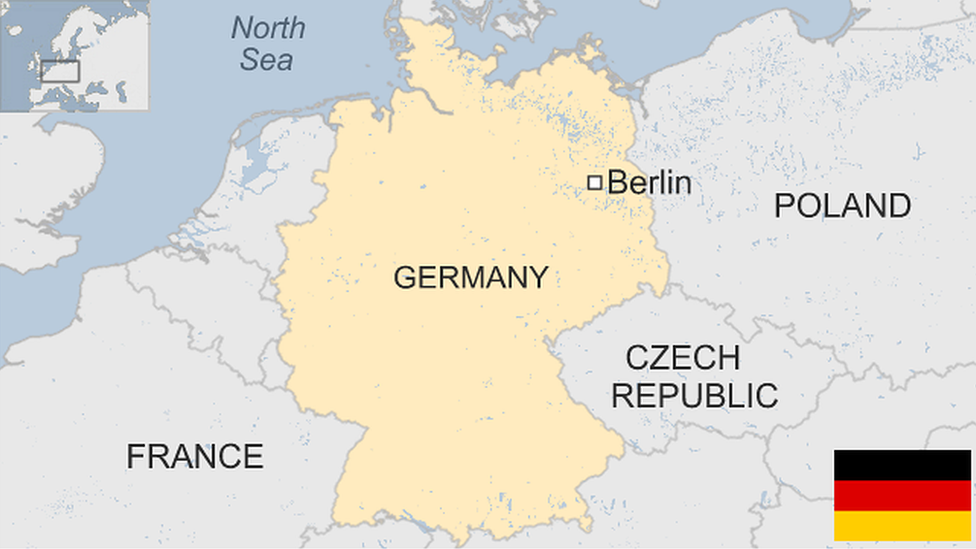Profile: Peer Steinbrueck
- Published
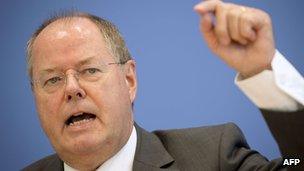
Peer Steinbrueck has rejected any new "grand coalition" with Mrs Merkel
Peer Steinbrueck, the centre-left challenger who was hoping to oust Chancellor Angela Merkel, argues that struggling southern Europe needs much more than her recipe of budget cuts to reduce the eurozone debt mountain.
He failed by a distance to beat Mrs Merkel, and has ruled out joining her in a coalition - meaning he may be left out if his party decides to go ahead without him.
The Social Democrat (SPD) candidate says it is time for Germany to show solidarity and help its EU partners.
In a big interview with German ARD television, Mr Steinbrueck reminded voters that the seeds for Germany's "economic miracle" after World War II were sown by the US Marshall Plan - generous aid to rebuild its devastated economy.
"Germany is in a liability union - Germany will have to pay for the stability of Europe and the eurozone," he said.
In contrast, Mrs Merkel has resisted calls for pooling eurozone debt - for assuming joint liability. She says the most heavily indebted countries must first restore budget discipline before any talk of joint "eurobonds".
Mr Steinbrueck accuses Mrs Merkel of aggravating record unemployment in countries like Greece and Italy through her insistence on austerity.
He says Mrs Merkel's policy has failed because "just saving, saving, saving is the wrong crisis strategy" and will not ensure stability in the eurozone.
Like France's Socialist President Francois Hollande, he says it is time to shift from austerity to measures that stimulate economic growth and set up an EU banking union sooner than Mrs Merkel envisages.
Minimum wage demand
Mr Steinbrueck, 66, served as finance minister in Mrs Merkel's "grand coalition" in 2005-2009. But the CDU partnership with the SPD was an awkward compromise and Mr Steinbrueck ruled out any repetition of it, whatever the election result this time.
A photo of him giving a vulgar finger gesture, on the cover of Sueddeutsche Zeitung magazine on 13 September, triggered much comment. Political rivals said it demeaned him and showed he was not chancellor material. He hit back, saying he was annoyed with journalists who confronted him with "yesterday's news".
On the domestic front, he says his priority is to establish a national hourly minimum wage of 8.5 euros (£7; $11). Mrs Merkel rejects such a blanket wage policy, saying sectors should decide individually whether to opt for a minimum wage settlement.
According to Mr Steinbrueck, the lowest-paid workers are getting so little that they are a drain on the welfare system.
Mr Steinbrueck says he would also scrap the childcare subsidy system, which he argues keeps too many women at home when they could be out working.
In the workplace men and women doing the same job should earn the same wage, he says. It is part of his social justice platform - a campaign to narrow the gap between Germany's rich and poor.
He would also raise the income tax rate for people earning above 100,000 euros annually to 49%, from 42%.
Blunt language
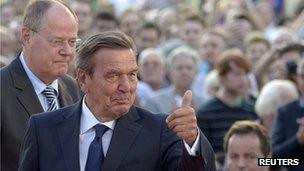
Hanover rally: Ex-Chancellor Gerhard Schroeder backs Mr Steinbrueck
He has made the fight against tax evasion a central theme in his campaign.
His outspokenness on that issue riled Germany's neighbours Luxembourg and Switzerland in 2008-2009 when he was finance minister. Both countries are tax havens which have come under considerable German pressure to stop enabling German tax dodgers to operate secret bank accounts.
He offended Swiss politicians by comparing the campaign against tax havens to a Wild West cavalry charge. Then he put Luxembourg and Switzerland in the same category as "Ouagadougou" when describing tax havens - a comment which also offended Burkina Faso, whose capital is Ouagadougou.
Undiplomatic language also triggered a snub in February this year from Italian President Giorgio Napolitano, who cancelled a dinner with him.
Reacting to the Italian election, Mr Steinbrueck said he was "shocked to a certain degree that two clowns have won". He was referring to former Prime Minister Silvio Berlusconi and comedian-turned-politician Beppe Grillo, whose internet-based Five Star Movement stunned most observers by coming a strong third.
When ARD asked him about the Greek debt crisis Mr Steinbrueck said he would oppose any second "haircut" for private holders of Greek debt, warning that it would frighten off investors in the eurozone. Private creditors reluctantly agreed to write off up to 74% of their Greek debt, in a highly controversial bailout deal.
Mr Steinbrueck insisted that Greece must be kept in the eurozone, as the currency union "cannot be used like some lab test".
He compared any "Grexit" from the eurozone to pulling a loose thread in a knitted jumper - the whole garment could unravel.
Mr Steinbrueck was born in Hamburg in 1947 and studied economics at the University of Kiel.
After graduation he worked in several government ministries and later served as head of the North Rhine-Westphalia government. It is Germany's most populous region, including major industrial centres in the Ruhr.
- Published23 August 2013
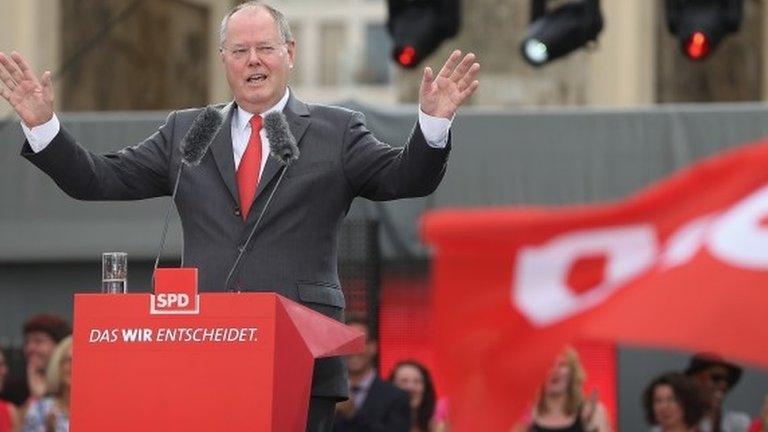
- Published3 June 2019
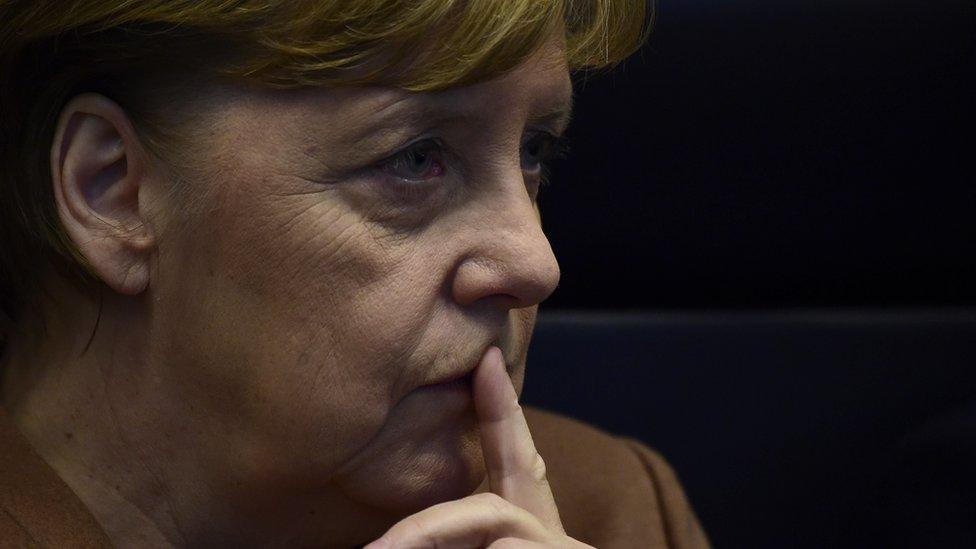
- Published4 September 2023
